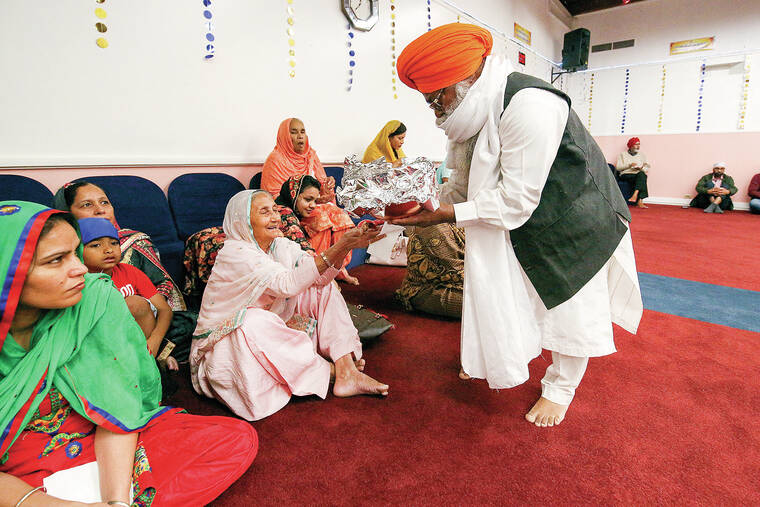Casteless utopia: California religious group backs bill to ban caste discrimination
FRESNO, California — For decades, worshipping in temples, Ram Asra has sung spiritual songs known as kirtans.
He did so on a recent Sunday at the Shri Guru Ravidass Sabha in Fresno, California, seated cross-legged on a dais in the temple’s prayer hall playing a harmonium. Devotees closed their eyes and swayed to the calming melody.
ADVERTISING
But not all of Asra’s experiences in sacred spaces have been so sublime. He is a member of the former untouchable caste in India, and recounted a time when he was pulled aside at another U.S. temple and told not to enter the kitchen.
“I felt so disrespected,” he said.
Asra feels much more secure at the Fresno Ravidassia temple. Congregants follow Guru Ravidass, a 14th century Indian teacher who also belonged to the former untouchable caste whose members are also known as Dalit, which means “broken” in Hindi.
Several congregants, who say equality is at the heart of their faith, are now championing a bill which aims to outlaw caste discrimination in California. Caste is a division of people based on birth and descent.
If the legislation passes, California will become the first state to add caste to its nondiscrimination laws. In February, Seattle became the first U.S. city to pass a similar law.
There are about 20,000 members of the Ravidassia community in California’s Central Valley — a vast majority of them with roots in Punjab in northwestern India. There are five Ravidassia temples in California alone — in Fresno, Pittsburg, Rio Linda, Selma and Yuba City — with a sixth under construction in Union City.
Signs supporting the bill grace the walls of the Fresno temple. Annihilating caste is intrinsic to the Ravidassia ethos, said Amar Daroch, president of the Fresno temple. He said Guru Ravidass envisioned a classless, casteless utopia he called “Begampura,” which means “a land without sorrow” in Hindi.
“Our goal is to create Begampura right here,” he said.
The legislation has been met with strong opposition from groups who say it will lead to discrimination against Hindu Americans and those of Indian descent. Several Dalits have also spoken against it, saying they do not wish to be burdened with a caste identity that they feel is irrelevant in this country.
But many in the Ravidassia community believe this law would bring attention to a problem they say does affect their lives.
In California, members of the Ravidassia community come from Hindu, Indigenous and Sikh backgrounds. Their temples have the appearance and feel of a Sikh gurdwara, with the sacred text, the Guru Granth Sahib, installed as the focal point in the main prayer hall. The text includes 40 verses of Guru Ravidass, in addition to other spiritual leaders.
Ravidassia religious practices vary from Sikhism. However, many in the community do identify themselves as Sikh and have much in common with the Sikh community including dress, food, language and other customs.
The principle of equality also forms the basis of Sikh theology, said Opinderjit Kaur Takhar, associate professor of Sikh Studies at the University of Wolverhampton in the United Kingdom, a city that has a sizeable Punjabi population including a large Ravidassia community.
Takhar said the Golden Temple in Amritsar, India, the most significant shrine in Sikhism, was designed with four doors, sending the message that “everyone from all walks of life, all corners of the world and all castes are welcome to come in and be together.”
She mentioned the importance of a post-worship community meal known as langar, saying its purpose “is to sit down as equals and share food with everyone regardless of caste, which used to be taboo.”
Vinod Kumar Chumber, chairman of the Shri Guru Ravidass Sabha in Union City, California, said those teachings on equality have not translated into reality in the U.S. and beyond. In Punjab, Chumber said each village has gurdwaras led by dominant-caste members and those run by Dalits.
“Things are improving, but people are still not being treated equally,” he said. “We figured it was best for us to have our own places of worship where we can freely practice our customs and celebrate our festivals.”
Members of the Fresno Ravidassia community say fighting for equality is part of their history and their spiritual DNA, which has motivated them to come forward with their stories despite the potential repercussions of being exposed to the larger community as “lower-caste.” Community members say they still experience discriminatory treatment from people who share otherwise share everything from culture and food to language and national origin.
Harbhans Singh said his friend opened a grocery store in a largely South Asian neighborhood in Central California that did well in the beginning, but “his business flopped” once customers learned his caste.
“He had to shut down his business,” he said. “How can this still happen in the United States?”
Harblas Singh, who worked at a poultry plant near Fresno, said his Punjabi colleagues refused to sit with him at lunch after learning he was Dalit.
“I came to this country hoping that I can break away from the chains of caste,” he said. “But it seems as if we cannot accomplish that as human beings. We need the law to do that for us.”
Rajinder Ganger, who used to run a trucking company in Selma, said one of his upper-caste drivers quit after learning Ganger’s caste identity.
“He said his relatives were berating him for working with me,” he said.


